Jump to: Accidents | Diabetes | Emergency Plan | Exercise | Family History | Flu Shot | Hearing Loss | Lung Cancer | Melanoma | Primary Care | Prostate Cancer | Urine Stream | Vaping | Vitamin D | Accidents | Your Team |
Day 16
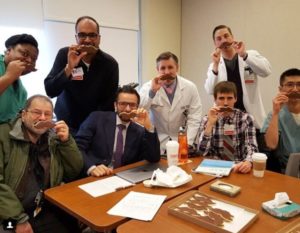 Meet your MD Anderson at Cooper genitourinary tumor board. Every Friday, as a medical oncologist, I congregate with my fellow urologists, radiologists, pathologists, and radiation oncologists to discuss complicated cancer cases. We are basically the Think Tank for these cases, with the goal being to provide our cancer patients with excellent care by discussing them in a multidisciplinary fashion to provide them with the best and most comprehensive treatment options. It’s one of the benefits of coming to a major academic cancer center. This is one of the best avenues for patients to get the most up to date care, including access to clinical trials.
Meet your MD Anderson at Cooper genitourinary tumor board. Every Friday, as a medical oncologist, I congregate with my fellow urologists, radiologists, pathologists, and radiation oncologists to discuss complicated cancer cases. We are basically the Think Tank for these cases, with the goal being to provide our cancer patients with excellent care by discussing them in a multidisciplinary fashion to provide them with the best and most comprehensive treatment options. It’s one of the benefits of coming to a major academic cancer center. This is one of the best avenues for patients to get the most up to date care, including access to clinical trials.#cooperuniversityhealthcare #movember #streamteam
Day 15
 I love the snow! You know what I don’t love? Getting hit by a car. Yeah… that happened to me today walking to the gym. Was crossing when a car couldn’t stop and skidded and clocked me on my side knocking me over. I’m ok though, but you should see that car 😜💪. I want to use today’s post to bring attention to weather related safety. Almost 7500 people die in weather related accidents each year with a whopping 673,000 injuries…well, 673,001 now. Before we really hit the thick of winter, make sure you’re car has been thoroughly inspected: brakes, tires, etc. No one wants to get hit by you. And as I have duly pointed out, when walking, be extra careful. You may be able to stop on a dime, but a car can’t.
I love the snow! You know what I don’t love? Getting hit by a car. Yeah… that happened to me today walking to the gym. Was crossing when a car couldn’t stop and skidded and clocked me on my side knocking me over. I’m ok though, but you should see that car 😜💪. I want to use today’s post to bring attention to weather related safety. Almost 7500 people die in weather related accidents each year with a whopping 673,000 injuries…well, 673,001 now. Before we really hit the thick of winter, make sure you’re car has been thoroughly inspected: brakes, tires, etc. No one wants to get hit by you. And as I have duly pointed out, when walking, be extra careful. You may be able to stop on a dime, but a car can’t.
#cooperuniversityhealthcare #movember
Day 14
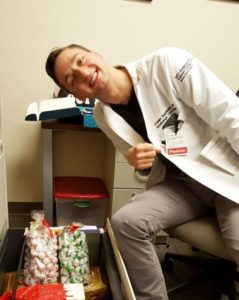 Just got my shipment of holiday truffles in for my candy bowl in my office. A piece of chocolate every once in a while is good for the soul, but eating candy on a regular basis can be risky for one’s health. Type 2 diabetes is the most common form of diabetes, and is commonly associated with excess sugar intake, excess of body weight, and insufficient exercise. Prevention of diabetes can involve maintaining a healthy diet with regular exercise as well as maintaining a normal body weight. Unfortunately, according to the American diabetes Association, 30 million Americans will still be affected by diabetes this year. This puts people at risk for a number of complications including heart disease, stroke, and kidney failure.
Just got my shipment of holiday truffles in for my candy bowl in my office. A piece of chocolate every once in a while is good for the soul, but eating candy on a regular basis can be risky for one’s health. Type 2 diabetes is the most common form of diabetes, and is commonly associated with excess sugar intake, excess of body weight, and insufficient exercise. Prevention of diabetes can involve maintaining a healthy diet with regular exercise as well as maintaining a normal body weight. Unfortunately, according to the American diabetes Association, 30 million Americans will still be affected by diabetes this year. This puts people at risk for a number of complications including heart disease, stroke, and kidney failure.
Your doctor can check for diabetes by checking a blood test called a hemoglobin A1C. According to the American diabetes Association, a level of 6.5% or higher is diagnostic of diabetes, however, a level above 5.7% can indicate prediabetes, a condition which can be managed by lifestyle changes. Should you be found to have prediabetes, losing weight and increasing exercise can you reduce your risk of developing full-blown diabetes. Should you be diagnosed with diabetes, a number of treatment options and lifestyle changes exist to reduce your complication risk from diabetes.
So as the holidays approach feel free to enjoy that occasional sweet, however, watch excessive intake! Staying healthy is worth it!
#cooperuniversityhealthcare #movember #americandiabetesassociation
Day 13
 Today we had a fake bomb scare at work and were temporarily locked down. In the moments of confusion, I realized I didn’t really know our escape plan. So… what’s your escape plan?
Today we had a fake bomb scare at work and were temporarily locked down. In the moments of confusion, I realized I didn’t really know our escape plan. So… what’s your escape plan?
Each year, approximately 4000 deaths occur in the US from house fires and accidental carbon monoxide poisoning. Many of these would have been preventable with proper fire and carbon monoxide detectors. Is your home equipped with both? Do they work? Now is the perfect time of year to test your alarm system, especially as the winter months approach and heaters kick in. Many older homes are also not equipped with carbon monoxide detectors. These can be a lifesaver… so get them. Lastly, in case of a fire or other emergency… do you and your family know your escape route and plan? Have one. Had there been a real emergency today… I may have been caught unprepared. Won’t make that mistake twice! Neither should you!
#cooperuniversityhealthcare #movember
Day 12
 It’s the most wonderful time of the year, so I gave in today and started listening to Christmas music. So my headphones are in, bopping around the apartment, setting up the Christmas tree, when I thought of the perfect post for today. Listening to music is great, but listening to loud music through headphones is not. Every day, we are exposed to excessively loud noises, particularly through current headphone technology. With prolonged exposure and time, these sounds can damage sensitive structures in the inner ear and cause noise induced hearing loss. This type of hearing loss is often permanent. Unfortunately, we don’t always notice the damage happening until it’s too late. A recent study by the CDC showed that up to 24% of adults have features of hearing loss in one or both ears due to exposure from loud noise. Pediatric research has also identified that is up to 17% of teenagers may have early signs suggestive of noise induced hearing loss in one or both ears. Research shows that long or repeated exposure to sounds above 80 decibels (dB) can cause hearing loss. A current iPhone on maximum volume can emit sound up to 115 dB. Symptoms of hearing loss can include ringing in the ears, or tinnitus. Once gone, hearing cannot be regained, but hearing loss can be prevented by avoiding loud noise, wearing earplugs, and avoiding sudden explosive noises. If you think you may have hearing loss, a simple hearing test can evaluate for this. Check with your local primary care doctor.
It’s the most wonderful time of the year, so I gave in today and started listening to Christmas music. So my headphones are in, bopping around the apartment, setting up the Christmas tree, when I thought of the perfect post for today. Listening to music is great, but listening to loud music through headphones is not. Every day, we are exposed to excessively loud noises, particularly through current headphone technology. With prolonged exposure and time, these sounds can damage sensitive structures in the inner ear and cause noise induced hearing loss. This type of hearing loss is often permanent. Unfortunately, we don’t always notice the damage happening until it’s too late. A recent study by the CDC showed that up to 24% of adults have features of hearing loss in one or both ears due to exposure from loud noise. Pediatric research has also identified that is up to 17% of teenagers may have early signs suggestive of noise induced hearing loss in one or both ears. Research shows that long or repeated exposure to sounds above 80 decibels (dB) can cause hearing loss. A current iPhone on maximum volume can emit sound up to 115 dB. Symptoms of hearing loss can include ringing in the ears, or tinnitus. Once gone, hearing cannot be regained, but hearing loss can be prevented by avoiding loud noise, wearing earplugs, and avoiding sudden explosive noises. If you think you may have hearing loss, a simple hearing test can evaluate for this. Check with your local primary care doctor.
#cooperuniversityhealthcare #movember #alliwantforchristmasismyhearing
Day 11
 I get half my genes from this goofball. He’d argue that’s my intelligence and charming personality. But it also means I can inherit a predisposition to diseases and illnesses that my parents might have. Which is why it’s so important to know your family history with regards to health. My dad has high blood pressure and cholesterol, so I make sure to get mine checked annually to head off problems early.
I get half my genes from this goofball. He’d argue that’s my intelligence and charming personality. But it also means I can inherit a predisposition to diseases and illnesses that my parents might have. Which is why it’s so important to know your family history with regards to health. My dad has high blood pressure and cholesterol, so I make sure to get mine checked annually to head off problems early.
Fortunately for me, there is not too much cancer in my family, but this is important to know. Men who have a strong family history of prostate cancer should consider screening starting at age 45, or even 40 if you have multiple family members diagnosed at a young age. Got a family member with colon cancer? The American Cancer Society recommends most people start screening at age 45, but some may need to start earlier depending on their personal and family risk. Bottom line is this: know your family’s health conditions and tell your doctor about them. You don’t get to choose your family or your genes, but you can choose how you apply that information to help protect your health!
#cooperuniversityhealthcare #movember #igetitfrommydad
Day 10
Everyone knows I love a good glass of red wine. Today I’m at a wine auction sponsoring the next generation of underserved aspiring doctors… so let’s talk wine!
Wine is often touted for its health benefits. Everyone loves talking about resveratrol, a natural compound found in grapes that has been said to treat heart disease, cancer, and other ailments. Unfortunately, no conclusive evidence has supported these claims. Now, while wine is good for the occasional celebration and social lubricant, it can have some serious adverse health effects.
For men, most medical societies recommend no more than two drinks per day. And by the way, a “drink” is defined as a 12 ounce beer, 5 ounce glass of wine, or 1.5 ounce shot of liquor. Sometimes my dad likes to put a full glass of vodka and say that’s a drink. Sorry bro… no it’s not. Excessive drinking has been linked to liver disease, high blood pressure, and some cancers, including colorectal cancer and head and neck cancers.
So today, enjoy that glass of wine. But don’t go crazy. Your body will thank you !
#cooperuniversityhealthcare #movember #wine
Day 9
 For #flashbackfriday, I bring you back twelve years ago to sunnier days on vacation in Aruba. I know I know, I haven’t aged a day! You know why? I wear sunscreen everyday.
For #flashbackfriday, I bring you back twelve years ago to sunnier days on vacation in Aruba. I know I know, I haven’t aged a day! You know why? I wear sunscreen everyday.
Unfortunately I didn’t at this time, and my pale skin got sun poisoned on this trip, which taught me a valuable lesson: sun protection is important! Furthermore, I have a family history of melanoma, so this is particularly important for me. Melanoma is the most dangerous and deadliest type of skin cancer and is most commonly caused by exposure to UV radiation, though genetics can also factor in. Blistering sunburns can double a persons chance of developing melanoma. Tanning beds are no safer that natural sun either, so stay away.
The good news is, if detected early, melanoma can be cured, which is why I see a dermatologist twice a year for skin exams. I also check for the ABCDEs of my freckles and moles: asymmetry, irregular borders, change in color, diameter greater than 5-6mm, and evolution, meaning changes in your moles. If you see these features, get checked! Tans may look good, but skin cancer doesn’t, so use sun protection! It can save your life!
#cooperuniversityhealthcare #movember #melanoma
Day 8
 After Monday’s post I got a lot of questions regarding vaping as a safe alternative to smoking. While electronic cigarettes and vaping have been around for almost a decade now, we do not yet have enough research long term to know the true dangers of these substances. More concerning, vaping is becoming rapidly popular amongst young adults, meaning when we finally do identify the true dangers of inhaling perfumed liquid into your lungs, an entire new generation will be affected. It’s so alarming that in 2016 the surgeon general concluded that electronic cigarette use in young adults was a major public health concern.
After Monday’s post I got a lot of questions regarding vaping as a safe alternative to smoking. While electronic cigarettes and vaping have been around for almost a decade now, we do not yet have enough research long term to know the true dangers of these substances. More concerning, vaping is becoming rapidly popular amongst young adults, meaning when we finally do identify the true dangers of inhaling perfumed liquid into your lungs, an entire new generation will be affected. It’s so alarming that in 2016 the surgeon general concluded that electronic cigarette use in young adults was a major public health concern.
While they may seem harmless, e cigarettes still contain multiple harmful chemicals, including nicotine, formaldehyde, heavy metals, and diacetyl, a chemical known to cause a permanent lung disease called “popcorn lung.” Chemicals in inhalants found in e cigarettes have also been linked to cancer development.
So, while we don’t know the true long term risks, most leading cancer and lung authorities do no consider e cigarettes a safe alternative to traditional cigarettes. So put it down. It isn’t cute, and it just may kill you.
Day 7
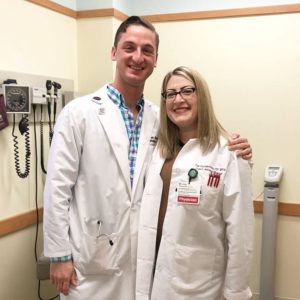 Meet my most wonderful primary care doctor: Dr. Kim Rozengarten! In addition to being one of the best doctors at Cooper, she cares for many of my patients. And me!
Meet my most wonderful primary care doctor: Dr. Kim Rozengarten! In addition to being one of the best doctors at Cooper, she cares for many of my patients. And me!
I may be healthy, but I still need a primary care doctor. You do too! That’s why today’s post is all about primary care, because an ounce of prevention is worth a pound of cure.
Primary care doctors do so many things to not only get us healthy, but to also KEEP us healthy. They diagnose and treat a wide array of conditions. They can also serve to identify any specialists you may need. All too often I see patients who say “but doc, I was healthy until now. I never had to see a doctor.” That’s where they went wrong. You may FEEL healthy, but it doesn’t mean you are. Diseases like high blood pressure, diabetes, and high cholesterol are often referred to as silent killers because you don’t feel any symptoms until well after the damage has been done. Same goes for cancer! Primary care doctors can help head off all of these problems early.
So, if you have a primary care doc, Great! Get your annual check up! If not, check with your insurance provider to find your network and get one ASAP. They quite literally can save your life!
#cooperuniversityhealthcare #movember #primarycare
Day 6
 Today I exercised both my body and my right to vote!
Today I exercised both my body and my right to vote!
Your friendly movember reminder for the day is to EXERCISE! Americans live way too sedentary of a lifestyle! Heart disease remains a top killer of men in the US. The American Heart Association recommends at least 150 minutes per week of moderate exercise or 75 minutes per week of vigorous exercise (or a combination of moderate and vigorous activity.). #cooperuniversityhealthcare #movember #americanheartassociation #getmoving #ivoted
Day 5
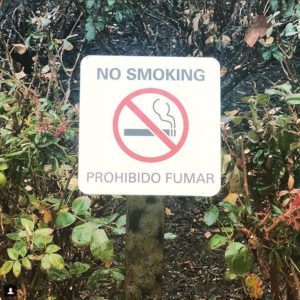 At MD Anderson, smoking is not allowed on the grounds. Why? Smoking remains a huge killer in the US… and there really is no upside. According the the American Lung Association, smoking will kill over 480,000 people this year, making the the leading cause of PREVENTABLE death in this country. In fact, smoking causes about 90% of all lung cancer deaths, and lung cancer remains the number one cause of cancer related death in men! And this is a preventable cancer for most!
At MD Anderson, smoking is not allowed on the grounds. Why? Smoking remains a huge killer in the US… and there really is no upside. According the the American Lung Association, smoking will kill over 480,000 people this year, making the the leading cause of PREVENTABLE death in this country. In fact, smoking causes about 90% of all lung cancer deaths, and lung cancer remains the number one cause of cancer related death in men! And this is a preventable cancer for most!
Want to reduce your risk of getting and dying from lung cancer? Put down that cigarette. Save the money and go do something else with it. You’re literally paying tobacco companies to kill you. Already smoking? That’s fine. Quit. Quitting reduces your future risk of developing lung cancer.
Been smoking for a while? You should consider lung cancer screening, which aims to find lung cancers at an earlier and more treatable and curable stage. This is appropriate for people over the age of 55 who have been smoking currently or quit within the past 15 years. You also need to have a 30 pack year history of smoking, which means smoking one pack a day for 30 years or 2 packs a day for 15 years. The test is simple! A low dose CT scan of your chest is performed. Nothing invasive, not even an IV!
#cooperuniversityhealthcare #movember #mdandersoncancercenter #lungcancer #americanlungassociation
Day 4
 The beautiful view of the fountain in Central Park in fall has me thinking: men, how’s your stream doing?
The beautiful view of the fountain in Central Park in fall has me thinking: men, how’s your stream doing?
As you get older, men can develop a non cancerous growth of the prostate called benign prostatic hyperplasia (BPH). Symptoms may include frequent urination, trouble starting to urinate, a weak stream, feeling like you haven’t completely emptied your bladder, or an inability to urinate. Got these symptoms? Get to a urologist, who can diagnose the problem and prescribe medications to help with symptoms. It’s also important to rule out prostate cancer as it too can present as enlargement of the prostate gland with similar symptoms.
Blood in the urine? If your urine looks like tea or fruit punch, this is not ok. This warning sign can also be a sign of prostate, bladder, or kidney problems. Seek medical attention immediately!
#cooperuniversityhealthcare #movember #centralpark #nyc #streamteam
Day 3
Waking up this morning to a nice glass of milk. Helps me get my Vitamin D for the day. Why is vitamin D so important? Well, it’s been known to be a key part of bone health for a while, but now, low vitamin D levels may be associated with an increased risk of colorectal cancer.
A new study published in the Journal of the National Cancer Institute linked low Vitamin D levels to a 31% increased risk of developing colorectal cancer.
While the sun naturally helps us get Vitamin D, no one wants skin cancer, so drink that cold glass of milk today. Your colon will thank you.
#cooperuniversityhealthcare #movember #vitamind #coloncancer #americancancersociety
Day 2
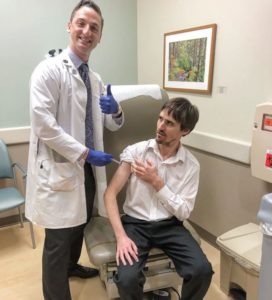 Men’s health isn’t all about cancer! It’s that time of year to get your flu shot! We doctors do it too! Flu activity in the US is low now but will likely pick up by the end of the month, which is why getting your flu shot now is super important! The CDC RECOMMENDS the yearly flu vaccine for people aged six months or older. You are at particularly high risk if you are a young child (and in that case, shouldn’t be reading this on social media), over age 65, or have another serious medical condition like lung, heart, kidney disease or have a weakened immune system.
Men’s health isn’t all about cancer! It’s that time of year to get your flu shot! We doctors do it too! Flu activity in the US is low now but will likely pick up by the end of the month, which is why getting your flu shot now is super important! The CDC RECOMMENDS the yearly flu vaccine for people aged six months or older. You are at particularly high risk if you are a young child (and in that case, shouldn’t be reading this on social media), over age 65, or have another serious medical condition like lung, heart, kidney disease or have a weakened immune system.
Also, getting the flu shot isn’t just about protecting yourself. It’s about protecting others around you who may be exposed if you get the flu, like young children or infants, the elderly, or pregnant women. This is why doctors get the shot! We don’t want to make our patients sick!
#cooperuniversityhealthcare #flushot #movember
Day 1
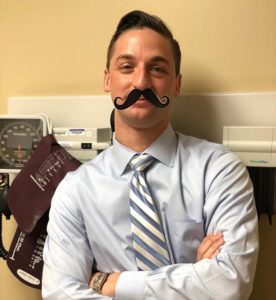
This month kicks off Movember. What is this you ask? Well, it’s much more than just growing a mustache! It’s about bringing attention to men’s health issues, which guys in general are pretty poor at doing! So this month, yours truly will be posting daily to bring attention to these important topics!
To kick us off: let’s talk prostate cancer, a topic near and dear to my oncologist heart. Prostate cancer remains the most common non-skin cancer diagnosed in men and the second most common cause of cancer death in men (after lung cancers). While not much can be done to PREVENT it, screening for prostate cancer is possible to detect it in an earlier, more treatable form. The American Cancer Society recommends men over the age of 50 talk to their doctors about the pros and cons of screening. If you are African American or have family members who have had prostate cancer, you may want to get checked earlier. Testing is easy and not as bad as it sounds, but you should know your choice! Don’t have anyone to talk to? Find a good primary care doctor or look for free community screening projects in your area. Cooper University Healthcare in partnership with MD Anderson Cancer Center at Cooper offers this to our community!
Christian Squillante, MD, is a Hematologist/Medical Oncologist with MD Anderson Cancer Center at Cooper. He is affiliated with the Head and Neck Cancer Center, Lung Cancer Center, Prostate Cancer Center, and the Rare Cancers Program.
